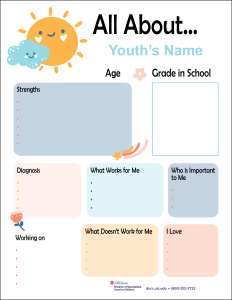Honor National Family Caregivers Month by Caring for Yourself
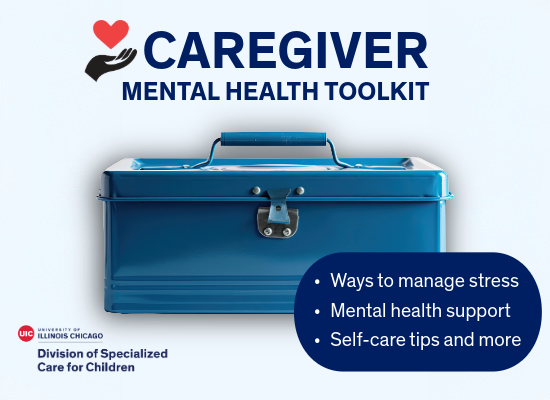
We’ve developed resources to help you support your mental health, reduce stress and connect with others who understand.
November is National Family Caregivers Month, a time to recognize and celebrate the incredible dedication of families caring for children and youth with special healthcare needs.
At the Division of Specialized Care for Children (DSCC), we know that caregiving can be both a rewarding and challenging journey.
As you care for others, it’s just as important to take care of your own mental health.
Find Support in Our Caregiver Mental Health Toolkit
Our Caregiver Mental Health Toolkit can help you find the support and strategies you need to recharge and stay well.
This online resource offers practical tips, self-care strategies and mental health resources to help you navigate the unique demands of caregiving while prioritizing your own health and well-being.
The Caregiver Mental Health Toolkit includes:
- Stress management strategies and techniques to help you cope with tough times.
- Self-care tips and practical ways to nurture your own physical, emotional and mental health.
- Mental health support resources to connect you with professional help and support networks when needed.
- Apps, online tools, videos and podcasts you can access anytime.
We created this toolkit with input from our Family Advisory Council, which shared the importance of mental health support for caregivers like you.
Whether you’re a parent caring for a child, a family member supporting a loved one or anyone in a caregiving role, we encourage you to explore this free resource.
Connect With a Fellow Caregiver for Support
One of the most powerful supports you can have is a connection with another parent who truly understands.
We have a Home Care Family Outreach Associate on our team who understands the unique challenges of caring for a loved one with complex medical conditions firsthand.
Our Home Care Family Outreach Associate works to create a community for caregivers within DSCC and offer heartfelt support, connection and empowerment.
You can ask your DSCC care coordination team to refer you to the HCFOA. You can also email a request to speak with the HCFOA at DSCC-FamilySupport@uic.edu.
Learn more about Erica Stearns, our current HCFOA, on our Home Care Family Outreach page and in the short video below:
Take a Break with Caregiver Coloring Sheets
We’ve also designed four coloring pages to help caregivers relax and take time to relieve stress and practice mindfulness.
There are four designs available in both English and Spanish:
- Lighthouse (Lighthouse in Spanish)
- Sunflowers (Sunflowers in Spanish)
- Hot air balloons (Hot air balloons in Spanish)
- Gears and clock (Gears and clock in Spanish)
These printable pages are a simple way to pause, relax and focus on yourself.
More Mental Health Resources and Support
You can find more mental health resources in our online Resource Directory.
Be sure to also follow our DSCC Facebook page and Instagram page for helpful reminders and tips throughout the rest of the month.
Your DSCC care coordination team is also here to support you. They can listen, help identify your needs and find available services and resources.
As the heart of your child’s care team, we celebrate you this month and always!
Introducing “All About Me” Pages to Highlight Your Child’s Strengths, Needs and More

We’ve created free templates you can personalize to help doctors, schools and others get to know your child
It takes a village to care for children and youth with special healthcare needs. Parents and caregivers must partner with many different team members — specialists, nurses, therapists, educators and so on — to help their children reach their full potential.
Ensuring everyone understands your child and their unique needs can be exhausting. We want to help make it easier to share your child’s strengths, wants, goals and more.
We’ve created “All About Me” Pages that you can personalize to help anyone get to know your child. These free templates highlight what works best for your child, what they like and dislike and who they are as a person.
There are a variety of designs to choose from to help you capture your child’s personality and what makes them unique.
Visit the new “All About Me” Pages section of our website to see the templates and learn how to customize them for your child.
Our “All About Me” Page templates are available for anyone to download and customize.
If you are a Division of Specialized Care for Children (DSCC) participant and need help using the templates, please contact your Care Coordinator.
These pages are a result of feedback from our annual family surveys and our Family Advisory Council meetings.
We hope these pages can be helpful conversation starters with new doctors, nurses, teachers and other caregivers for your child.
New Training Resources on Caring for Children With Trachs
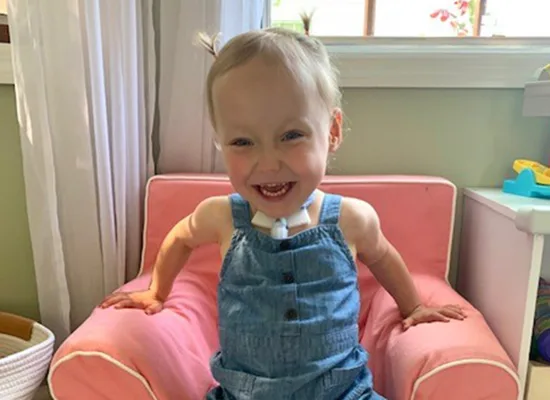
A new video and an updated free online course are available to help support the care of children with tracheostomy tubes
Parents and caregivers have a lot to learn when their child needs a tracheostomy (trach) tube to breathe.
Our Division of Specialized Care for Children (DSCC) team is here to support and guide families through learning how to care for their children’s complex medical needs.
We’ve gathered two new training resources to help families understand trach care.
Lurie Children’s Hospital Video on How to Handle Trach Emergencies
When emergency situations occur, it’s very important to keep the child’s trach tube open and in place.
Ann and Robert H. Lurie Children’s Hospital of Chicago has developed a video to help parents, caregivers and others know how to handle emergency situations with pediatric trach patients.
In this video, Lurie nurses explain:
- How to prevent and assess emergency situations
- How to manage a mucous plug
- How to replace a trach tube that has become dislodged
- What to do if the trach tube is difficult to replace
- When to provide manual ventilation using bag to trach tube, bag and mask to mouth, and mouth to mouth
We encourage our participant families in the Home Care Program to watch this video. Many of the children and youth in the Home Care Program rely on trachs and ventilators to breathe.
Please note that watching this video alone is not enough training to safely care for a child with a trach. Families should speak with their child’s doctors and care team about any questions or training needs.
For more information on how to safely care for a trach tube, you can visit Lurie’s Tracheostomy Care at Home webpage.
Free eHomeCare Course on How to Care for Children With A Trach
An updated free online course is available on how to care for children with trachs with or without a ventilator.
The eHomeCare program training is for:
- Nurses working in home-based environments
- Physicians
- Respiratory therapists
- Family members and caregivers of children with trachs with and without ventilators
- Students from health professions
The course is available until Sept. 30, 2026.
Learners can use this course for initial training, an annual review or as an ongoing resource.
The course learning objectives are:
- Describe best practices for providing day-to-day care for children with trachs with or without ventilators in the community
- Explain how to manage emergency situations for children with trachs with or without ventilators in the community
- Report an increase in confidence when caring for children with trachs with or without ventilators in the community
- Describe the roles and responsibilities of members of the healthcare team.
Free continuing education credits are available.
If you have trouble enrolling in the course or need help, please email help@icep.wisc.edu.
Again, please note that families should speak with their child’s doctors and care team about any questions or training needs for their child with a trach.
Our participant families can also contact their DSCC Care Coordinator with questions.
Leadership and Education Opportunity for Caregivers Living with Complex Medical Needs

National Consumer Scholars can develop leadership skills and share their experiences to help improve care and services for people with complex health and social needs
A leadership development program is available for caregivers and advocates who live with and/or care for someone with complex medical needs.
The Camden Coalition is accepting applications for its 2023-24 National Consumer Scholars program.
In the National Consumer Scholars program, caregivers and advocates can take part in peer-led leadership development activities. They play an active role in the coalition’s annual conference and bring lessons back to their local communities. Consumer Scholars also work alongside Camden Coalition staff to develop and inform the complex care field.
National Consumer Scholars have firsthand experience living with and/or caring for someone with complex health and social needs. They also have experience working as a consumer/patient advisor/advocate and/or community leader.
The program is open to individuals from across the country who represent many different experiences.
Learn more about the program and how to apply on the National Consumer Scholars program website.
The application deadline is May 31.
For more information, contact Evelyne Kane at ekane@camdenhealth.org.
Parent Education Workshop Series Open to All DSCC Families

DSCC partners with IL LEND to offer an online space for parents to learn about important topics, gain resources and discuss strategies
A new webinar series provides an online space for parents and caregivers to access educational workshops, learn about resources and discuss strategies and support needs.
The series is open to all parents and caregivers of children enrolled with the University of Illinois Chicago’s Division of Specialized Care for Children (DSCC).
It’s the result of a partnership between DSCC and UIC’s Leadership and Education in Neurodevelopmental and related Disabilities Program (IL LEND).
There is no cost for families to participate.
Please note this workshop series now has a parent education focus rather than a traditional support group.
The virtual workshops will take place via Zoom on the third Wednesday of the month through April.
Workshops topics may include:
- Respite care
- Feeding
- Ventilator maintenance/cleaning
- Transportation
- Navigating relationships with staff
The workshop schedule is for the following dates from 7 to 8 p.m.:
- Feb. 16
- March 16
- April 20
The topic for the Feb.16 session is Early Intervention. The guest speaker is Maria Kastanis, assistant director of the Early Intervention Training Program (EITP) at the University of Illinois at Urbana-Champaign.
The details and registration information for the next meeting are below:
- WHAT: Educational workshop series for parents/caregivers of children and youth enrolled in DSCC’s programs
- WHEN: Feb. 16, 7 to 8 p.m.
- TOPIC: Early Intervention (Note: the discussion part of the workshop will include a facilitator for Spanish-speaking families.)
- WHERE: Virtual via Zoom
- Registration link
Visit the workshop series website for more details about the series and individual meetings.
We’ll also post details about upcoming meetings in the Events section of our website.
If you have questions about the series or an individual meeting, please fill out the Contact Us section of the workshop series website.
New Support Group and Workshop Series for Home Care Families
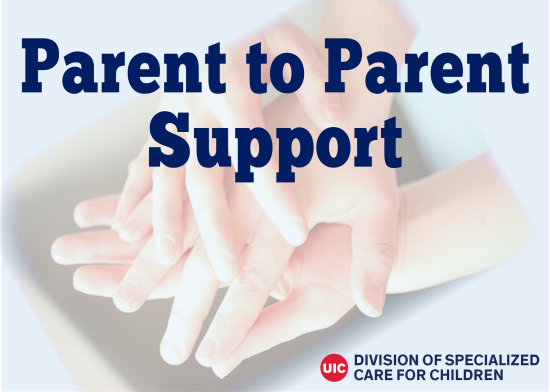
UPDATE: Please note this support group is now open to all families of children enrolled with the Division of Specialized Care for Children. See the latest support group news for more details.
The University of Illinois Chicago’s Division of Specialized Care for Children (DSCC) is partnering with UIC’s Leadership and Education in Neurodevelopmental and related Disabilities Program (IL LEND) to offer a support group for families enrolled in the Home Care Program.
The Home Care Program helps children and adults who require in-home nursing care. DSCC operates the Home Care Program on behalf of the Illinois Department of Healthcare and Family Services.
This support group will provide an online space for parents to access educational workshops and swap concerns, resources and strategies.
There is no cost for families to participate.
The group will meet on the third Wednesday of the month from November through April.
Workshops topics may include:
- Respite care
- Feeding
- Ventilator maintenance/cleaning
- Transportation
- Navigating relationships with Home Care staff
IL LEND would also like to hear families’ ideas for future support groups and workshop topics. You can share your feedback on this brief online form.
The support group schedule is for the following dates from 5:30 to 6:30 p.m.:
- Nov. 17
- Jan. 19
- Feb. 16
- March 16
- April 20
Here are details for the first session:
- WHAT: Virtual support group/workshop series for parents/caregivers of children and adults enrolled in the Home Care Program.
- WHEN: Nov. 17 from 5:30 to 6:30 p.m.
- TOPIC: Navigating the COVID-19 Pandemic (Note, the discussion portion of the support group will include a facilitator for Spanish-speaking families.)
- WHERE: Virtual via Zoom
- REGISTER: Please sign up online in advance. After registering, you will receive a confirmation email containing information about joining the workshop discussion via Zoom.
Podcast Highlights DSCC “Resource Hunter”

Mom’s new podcast features Care Coordinator Amanda Kaufman and how she helps children with medical complexity through DSCC
As a Care Coordinator in the Home Care Program, Amanda Kaufman guides parents and caregivers as they learn to care for their medically complex children at home.
One of those parents formerly on her caseload is Erica Stearns. Erica is the mother of two Home Care participants, 5-year-old Margot and 3-year-old Caratacus.
Earlier this year, Erica started a podcast called, “Atypical Truth.” The podcast focuses on issues affecting caregivers, individuals with disabilities and individuals with complex medical conditions.
Erica recently invited Amanda on the podcast to talk about her role at the Division of Specialized Care for Children (DSCC), where she works in our St. Clair Regional Office.
During the conversation, Erica spoke about how Amanda and DSCC have provided invaluable support to her family:
“DSCC was one of the first organizations to step into our lives. They were some of the first social workers who came into our home and really began helping us to navigate our new lives with a medically complex child.
The beginning of this experience was actually very difficult. It occurred during a time when I was still learning how to cope with the acceptance of the unexpected that came with this unknown diagnosis.
DSCC has played a tremendous role in helping our family to thrive, really. Not only have they helped to provide the means for us to care for our children at home rather than in a hospital or an institution, they’ve also supported us emotionally throughout every step of this journey.
They are the people who we can guarantee to check in on us regularly, to tell us about a resource or a charity that might benefit our children, and they even go so far as to send birthday cards to each of the kids, which I just can’t express it enough how touching and heartwarming that singular gesture is.”
Amanda talked about her background as a social worker and her passion for connecting families to the right resources.
“I love finding resources, and I love being successful at finding something that a family needs,” Amanda told Erica.
Amanda also shared how caring for her late mother now helps her relate to her participant families’ challenges and emotions.
You can access the entire podcast episode, titled “Resource Hunter,” on the Atypical Truth website. It is available for listening on all popular podcast streaming services.
A big thank you to Erica for featuring DSCC and highlighting Amanda’s compassion and commitment to our participant families!
What Happens When Caregivers Get Sick? Preparations During COVID-19 and Beyond
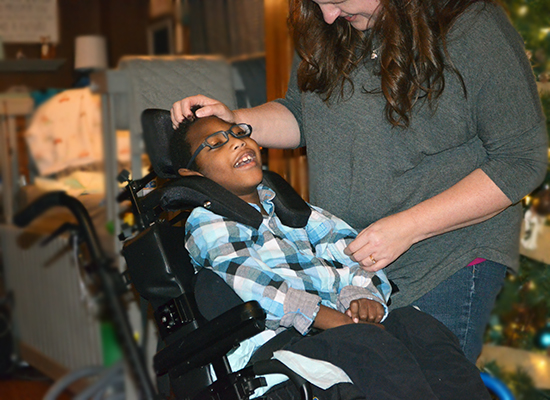
Tips to help parents of children with medical complexity prepare for their own illness and other emergencies
Parents and caregivers of children with medical complexity often focus solely on their child’s health and wellbeing. But what happens when the parent/caregiver gets sick?
It’s a crucial question that families must consider.
“Self-care is overlooked by many parents because they’re so focused on day-to-day care for their child and thinking about what happens if the child becomes ill. Sometimes the daily care of their child can really overshadow parents caring for themselves and making contingency plans if they become ill,” said Dr. Alexandra Ryan, Medical Director for Ann and Robert H. Lurie Children’s Hospital of Chicago’s Health Partners Care Coordination.
“Especially in a climate like this where we have a pandemic, it’s even more important for families to think about what happens if a parent or caregiver is unable to do that daily care.”
Advance preparations can help parents/caregivers reduce stress, lighten their mental load and protect the child’s health and safety during a family illness and other emergencies.
“It’s simply disaster planning and something that all families of children with medical complexity should do on an ongoing basis,” said Dr. Carolyn Foster, Assistant Professor of Pediatrics at Lurie. “For many of these children, they can’t have just any babysitter or relative come over and learn it all in five minutes… The needs are so specific for these children, it requires additional planning.”
Drs. Foster and Ryan spoke with UIC’s Division of Specialized Care for Children (DSCC) about how to start these conversations with your pediatrician during the pandemic and beyond.
Assess your risk
It’s important to learn how to mitigate your family’s risk of contracting COVID-19. Dr. Foster says you can talk with your pediatrician about how to balance this risk with your child’s needs.
“For some children, going to school will be really important because of the way their therapies are set up or what their school’s plans are for in-person learning,” she said.
Lurie has put together a helpful guide, “Return to School for Youth with Special Healthcare Needs: Key Questions and Considerations for Families.”
It includes questions to discuss with your child’s doctor.
Pediatricians can recommend prevention strategies and what works for other families in similar situations.
The next step is preparing for what happens if you do get sick and stay ill for an extended period.
During these conversations, pediatricians may ask about your family’s living situation, including your home’s physical setup and who could isolate with you.
“This information can help with the decision-making and planning, although it’s not something everybody may be comfortable or ready to talk about with their pediatrician,” Dr. Foster said. “In this case, it’s very relevant.”
Have an up-to-date care plan
One of the most important steps for parents of children with medical complexity in general is to make sure your child has an up-to-date care plan.
The care plan should include a description of your child’s major medical issues, a complete medication list, an overview of their daily routine, a list of their healthcare providers and a plan for what happens if your child becomes ill. (The National Resource Center for Patient/Family-Centered Medical Home provides numerous tools, templates and more to help build a care plan.)
You should also keep an inventory of your child’s necessary medical supplies and have a backup supply, when possible, in case you need to quarantine. (DSCC also provides guidance for how to safely clean and reuse home medical supplies.)
“Having that information available makes it easier for whoever needs to take over care for the child in an emergency,” Dr. Foster said. “So, starting to develop the care plan if they don’t have one already is very important.”
Choosing backup caregivers
The care plan should also identify appropriate backup options if you or the primary caregiver cannot care for your child. These options could include family members, friends, a respite or transitional-care facility, or the hospital.
It’s important to consider who is best suited to provide backup care and make sure these individuals are aware and willing to help.
“Something for parents to keep in mind as they are thinking about backup care is trust. It’s more important that parents trust this person with the medical care and that the child can also develop trust in this person, whether it’s your closest family member or not,” Dr. Ryan said. “It’s more important to think about the characteristics of the person and how much trust you have in that person’s ability to do the tasks for the child, rather than the relationship.”
Dr. Foster recommends letting the backup caregiver spend time with your child and practice administering medication, watch how to safely transfer them and so on.
“It reduces the stress for the person who has to step in so it’s not all new to them,” she said.
If a family member or friend is not available, Drs. Foster and Ryan suggest looking to your family’s faith or school community. You should also let your pediatrician know if you’re struggling to identify backup care.
Preparing for hospitalization
Depending on their medical complexity, some children may require hospitalization if their parent/caregiver becomes ill. Discuss this possibility with your pediatrician and identify your hospital preference and transportation needs.
Dr. Foster said pediatricians can help you find the least restrictive option available for your child, such as a long-term care or respite facility.
If hospitalization or a facility stay is necessary, write down any “need to knows” about your child and keep them with their care plan and medication list.
Dr. Ryan said it’s helpful to include information about your child’s baseline development and behavior, such as how they typically communicate, how your child looks when healthy, etc.
“So often if somebody is hospitalized, especially patients with mental disabilities or medical complexity, the patient team may not know what the child looks like when they’re healthy. If you don’t know the child, it can be really hard to tell if they’re sick,” Dr. Ryan said. “Making sure that’s something that’s communicated to everyone taking care of the child is really important.”
Dr. Foster said it’s also good to have a list of important phone numbers at the ready. These contacts should include any specific transportation needed to get your child to the hospital.
“If there are any specific transportation arrangements that the caregiver should know about, that should be part of the care plan,” she said.
Home nursing
Some children with medically complexity who have nursing in the home setting may be able to continue to stay at home but with extra nursing care, if the child’s primary caregiver is ill or incapacitated.
Illinois’ Medicaid Program has worked to ensure additional respite hours are available for children who receive services from a Medicaid waiver.
Let your nursing agency know in advance if you prefer this option for your child.
Plan for future guardianship needs
Parents/caregivers should always make sure they have a will in place. A will ensures your future guardianship needs and other important decisions are planned for accordingly.
“We all know, especially in today’s world, how quickly things can change, so it’s really important to put planning a will more on the front burner for any family, but especially if you have a child with medical complexity who is going to require specialized care,” Dr. Ryan said.
“If a family has gone through the mental exercise of figuring out who they trust and who they’d like to take care of their child in case they get sick, then who they’d like to care for their child in the long-term if something happens to them may be the same person,” she added. “It may not be someone who guardianship automatically goes to, so that’s why it’s so important to have something in writing going forward.”
Lurie and DSCC staff recommend the following resources:
- Greenlight Family Services – Formally known as the Center for Law and Social Work, Greenlight helps families all over Illinois with adult guardianship cases and can also counsel families on backup arrangements as well.
- Lurie’s Understanding Guardianship Tip Sheet – Available in English and Spanish
- Illinois Guardianship and Advocacy Commission
- The Guide to Special Needs Planning – Information on special needs trusts from the Academy of Special Needs Planners
- The Family Caregiver Alliance – Provides fact sheets on legal topics, including conservatorship and guardianship
- Family Voices resource e-blast – Includes tips for what to do if the caregiver gets sick/can’t care for their child
- Illinois Attorney General’s Office – Provides legal assistance referral information
- The National Hospice and Palliative Care Organization – Information on advance directives in Illinois
- The Conversation Project – Provides conversation starter kits to help families plan for their wishes regarding end-of-life care
Prioritize planning
Though these steps and conversations may require some additional effort, Drs. Foster and Ryan say they are well worth the time and peace of mind.
“I think there’s a lot of invisible stress that parents may not even realize they have on their mind,” Dr. Ryan said. “You can really tackle it by having a plan in case the worst happens. People will see a lightening of that mental load once they have a plan in place.”
Dr. Foster also notes that there is no one-size-fits-all approach to contingency planning.
“Like any family decision, yours might be slightly different than others,” she said. “It’s very individualized. I’ve heard parents worry about judgment or this is what others are doing, but it’s a personalized decision based on a family’s unique situation.”



